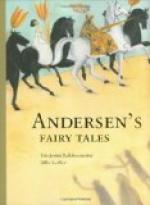A few persons in the costume of the time of King Hans passed quickly by him.
“How strange they look! The good folks come probably from a masquerade!”
Suddenly was heard the sound of drums and fifes; the bright blaze of a fire shot up from time to time, and its ruddy gleams seemed to contend with the bluish light of the torches. The Councillor stood still, and watched a most strange procession pass by. First came a dozen drummers, who understood pretty well how to handle their instruments; then came halberdiers, and some armed with cross-bows. The principal person in the procession was a priest. Astonished at what he saw, the Councillor asked what was the meaning of all this mummery, and who that man was.
“That’s the Bishop of Zealand,” was the answer.
“Good Heavens! What has taken possession of the Bishop?” sighed the Councillor, shaking his head. It certainly could not be the Bishop; even though he was considered the most absent man in the whole kingdom, and people told the drollest anecdotes about him. Reflecting on the matter, and without looking right or left, the Councillor went through East Street and across the Habro-Platz. The bridge leading to Palace Square was not to be found; scarcely trusting his senses, the nocturnal wanderer discovered a shallow piece of water, and here fell in with two men who very comfortably were rocking to and fro in a boat.
“Does your honor want to cross the ferry to the Holme?” asked they.
“Across to the Holme!” said the Councillor, who knew nothing of the age in which he at that moment was. “No, I am going to Christianshafen, to Little Market Street.”
Both men stared at him in astonishment.
“Only just tell me where the bridge is,” said he. “It is really unpardonable that there are no lamps here; and it is as dirty as if one had to wade through a morass.”
The longer he spoke with the boatmen, the more unintelligible did their language become to him.
“I don’t understand your Bornholmish dialect,” said he at last, angrily, and turning his back upon them. He was unable to find the bridge: there was no railway either. “It is really disgraceful what a state this place is in,” muttered he to himself. Never had his age, with which, however, he was always grumbling, seemed so miserable as on this evening. “I’ll take a hackney-coach!” thought he. But where were the hackney-coaches? Not one was to be seen.
“I must go back to the New Market; there, it is to be hoped, I shall find some coaches; for if I don’t, I shall never get safe to Christianshafen.”
So off he went in the direction of East Street, and had nearly got to the end of it when the moon shone forth.
“God bless me! What wooden scaffolding is that which they have set up there?” cried he involuntarily, as he looked at East Gate, which, in those days, was at the end of East Street.




